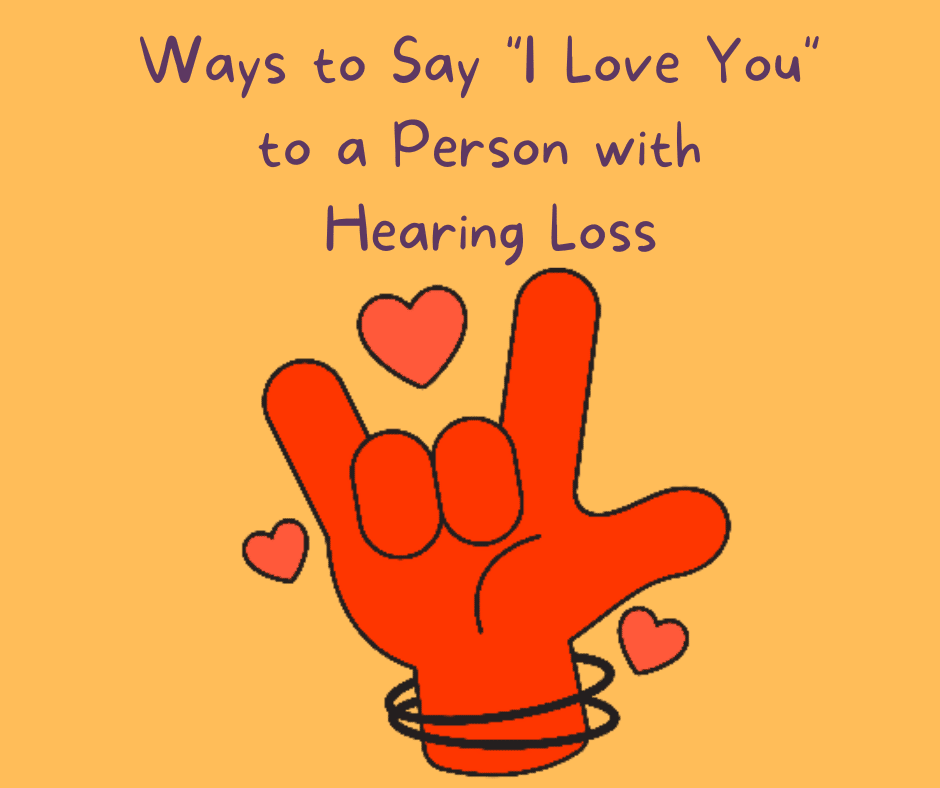This morning, the Hearing Husband looked at me and said I love you.
I know he said this even though I wasn’t up to speed technically; it was early and I had only one of my two hearing devices attached to my head. I am, however, a crackerjack speechreader and I saw him say it. After I said it back to him, it got me thinking about an article I wrote a few years ago, which I’ve adapted here in these few simple ways to say “I Love You’ to a person with hearing loss.
“I Love you.” Saying the words out loud is the simplest way. Of course, you get the person’s attention first, then face them and speak with clear but unexaggerated lip movement. And a smile helps, in case there’s any confusion about what you’re trying to say.
You leave the TV captioning on at all times, even when the person with hearing loss leaves the room to go to the bathroom. Either that, or you turn it back on at the sound of the first flush, which we assume a hearing person can hear from another room.
You let them know you can’t always understand what they’re going through, but you will always keep trying. Also, that their hearing loss has no bearing on your affection for them.
When you hug them, you don’t talk into their neck – unless they like it, or if they don’t need to read lips. For the rest of us, though, you will pull back and say it to our face.
You take the time to learn more about their assistive technology, to really understand how it works. Important stuff like how to put the battery in (if their hands are bandaged or otherwise engaged), or how it charges. After all, this stuff makes life better and more accessible for all of you.
Suggest that the two of you, or a group of family/friends, take a sign language course. The goal isn’t to become proficient signers, although that would be lovely, but visual communication improves overall communication. It’s fun and it creates bonds.
Attend and participate in hearing care appointments with your spouse, parent, child or friend. You’re not there as an interpreter, but to learn more about how you can be a better ‘hearing’ partner and create better communication.
You’re the man who anticipates what your partner needs. You’re the woman who doesn’t wait until your partner has to ask. “Hmm, that restaurant is too noisy or too dark for us.” You know what needs to be done and make it happen: best seating arrangements, turning up lights and turning down noise, talking one at a time, etc.
Speaking of talking, when the lights go out at night, you stop. If it’s urgent, turn the light back on and give the person time to reinsert a hearing aid or sound processor.
When you see that your ‘other’ has drifted out of a hard-to-follow conversation or is bluffing at full speed, you tactfully draw them back in and do whatever’s necessary to make the convo more accessible.
You learn the universal sign for I love you and you use it a lot.
I’m sure you have other examples of what says I love you to a person with hearing loss – care to share?








I was speaking with a small circle of friends before church. I had some difficulty due to the ambient noise level, but I thought I was doing ok. (I’d forgotten to adjust my hearing aid settings for this environment.)
My friend, standing just to my right, gently gestured to his wife (who was on his right, a bit away from me) to move closer to me so I could hear her better! He knew immediately I was having some trouble, and gently helped her to help me hear. That was really special to me, that he so graciously improved the situation, so subtly. That’s a good friend!
My husband adopted the three-fingerSign as his identity mark, after I became HOH!
Great article, as always. I have a wonderful hearing husband who says “I love you” in so many ways too. Sometimes I have to remember to see his side of it and the frustration of a non-hearing wife and say “I love you” in a thankful way too.